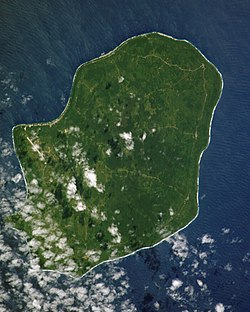Ko e Iki he Lagi
| English: The Lord in Heaven | |
|---|---|
National anthem of Niue | |
| Lyrics | Unknown |
| Music | Unknown; prepared by Sioeli Fusikata |
| Adopted | 1974 |
| Audio sample | |
Instrumental version, 2023 | |
"Ko e Iki he Lagi" (English: "The Lord in Heaven"), also titled in English as "Lord in heaven, Thou art merciful",[1] is the national anthem of Niue. It was adopted in 1974, when Niue became a self-governing state within the realm of New Zealand.

History
[edit]During Niue's history as a territory of New Zealand, the national anthem of Niue was New Zealand's "God Defend New Zealand". "God Save the King" was (and still is) the royal anthem of the monarchy of New Zealand. "Ko e Iki he Lagi" was created before the 1970s. It is not known who composed the words or the music, but it is known that it was prepared (i.e. set down on paper) by Sioeli Fusikata.[2][3] It had already become a popular song on Niue, but the opportunity had rarely arisen for people to sing it at public events. In the 1963 South Pacific Games, Niue used the Flag of New Zealand, in keeping with the rest of the colonies of the British Empire not using the Union Jack at the games. Niue also used "Ko e Iki he Lagi" as their anthem rather than "God Defend New Zealand", because the organisers had requested that "identifying tunes" be used to represent nations at the games instead of recognised national anthems.[4] However, Niue did not win any of the events, so "Ko e Iki he Lagi" was not heard publicly at the games.[5]
In 1974, the same year that Niue's new constitution granted Niue the status of free association with New Zealand upon the passage of the Niue Constitution Act 1974 in the Parliament of New Zealand, Niue adopted "Ko e Iki he Lagi" as their national anthem, superseding "God Defend New Zealand".[3] "God Save the King" was retained as the royal anthem to be used when the monarch is present in Niue.[6]
Lyrics
[edit]| Niuean original[6] | IPA transcription[a] | English translation[6] |
|---|---|---|
[ko e i.ki he la.ŋi] | The Lord in Heaven |
See also
[edit]Notes
[edit]References
[edit]- ^ "Niue [Niue National Anthem, "Lord in heaven Thou art merciful..."]". Music.ohiolink.edu. 1 June 2006. Retrieved 11 July 2014.
- ^ "Complete National Anthems of the World: 2013 Edition" (PDF). www.eclassical.com. 2012.
- ^ a b "Niue". CIA World Factbook. Retrieved 11 July 2014.
- ^ "Pacific Games". Pacific Islands Monthly. 34: 15. 1963.
- ^ "Pacific Games 1963 medalists" (PDF). Athletics Oceania. Archived from the original (PDF) on 30 October 2013. Retrieved 11 July 2014.
- ^ a b c "Niue". Nationalanthems.info. Retrieved 11 July 2014.
- ^ a b c "Niue Language Week - Flag Raising Ceremony 2015". Retrieved 11 February 2022.
- ^ Niue Youth Network NZ (16 October 2015). "NiueYouthNetworkNz Singing - Niue National Anthem, "Ko E Iki He Lagi"". YouTube. Retrieved 11 February 2022.


 French
French Deutsch
Deutsch